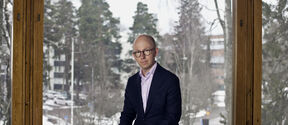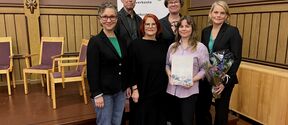Journal awards Emilia Lahti's sisu study as article of the year

The first research article by Emilia Lahti, adoctoral candidate studyingthe Finnish construct of sisu was published in 2019. It was also the first systematic study on sisu. Now the International Journal of Wellbeing has recognised the research article as the best article of 2019.
In the article, Lahti analysed data from the responses of more than 1,000 people using thematic analysis. The accolade of “Best Article of 2019” is all the more special, as Lahti was the sole author of the paper.
‘It was a personal project and the task was challenging as a first article. By now I know that I do not always have to choose the hardest path available.’
Lahti's doctoral dissertation is a hybrid type, comprising of one published article, and three essay-type articles. In the other articles of her sisu dissertation, Lahti discusses her run in New Zealand as an experiential inquiry into sisu, while creating a theoretical frame of reference for sisu based on the Systems Intelligence theory created by Professor Esa Saarinen and Professor Raimo P. Hämäläinen.
The in-depth phenomenological study on the 2400-kilometre New Zealand ultra-run utilizes Lahti's own experiences, observations, and reflections.
What Lahti found in her award-winning qualitative paper was that not all sisu is constructive or positive, and that it can also be non-constructive and even harmful. The systems intelligence framework developed by Saarinen and Hämäläinen specifically enables the development of constructive or beneficial sisu.
‘All humans universally share an innate capability for both systems intelligence, and sisu. The structures of the mind give support to both of these qualities, which is why they can be modified through thinking. A significant factor in this is self-reflection, or the ability to think about our thinking.’
Sisu is innate to everyone but when it occurs may seem random at times. Systems intelligence as a practice may assist in creating supportive mental structures for a more systematic use of sisu in people’s everyday lives. Systems intelligence is a framework that includes factors such as systemic perception, attunement, attitude, wise action, and effective responsiveness.

‘To attune to situations and people around us, as well as to ourselves, means to open to a kind of sensitivity around our inner strength and give up any blind stubbornness that could be said to denote non-constructive sisu. It is ultimately an invitation to deeper self-awareness and a better understanding of one's own thinking.’
Systems intelligence examines human activity and thinking in relation to each other and can lift sisu from being a mere quality of survival to that of enabling something beyond, which is thriving.
‘For example, the coronavirus pandemic can lead to a state of panic that can leave some people overwhelmed by fear and unable to tap into their cognitive reserves as they normally would. However, both systems intelligence and sisu are innate to every person. They do not need to be “found” per se (as if they were lost) but rather, they need to be nurtured and supported through right thinking and action. The same way that a seed underground will naturally reach toward the light, people will, under the right conditions, align themselves toward what makes them function in an optimal way. Some of these conditions are formed based on how we perceive things and orient ourselves toward each other.’
Further information:
Emilia Lahti
emilia.lahti@aalto.fi
www.emilialahti.com
Article from 2019: Embodied fortitude: An introduction to the Finnish construct of sisu
What the Finnish concept of sisu can offer the world
About sisu and psychological safety
Short version of the Aalto University wellbeing week keynote talk by Emilia Lahti 2.10.2019:
Read more news

Environmental Structure of the Year 2025 Award goes to Kalasatama-Pasila tramway
The award is given in recognition of meritorious design and implementation of the built environment. Experts from Aalto University developed sustainability solutions for the project.Landscape architect Sara Korkeamäki received the Lappset scholarship
In her thesis, Korkeamäki examines the multidimensional challenge of biodiversity loss and seeks solutions to it through landscape architecture.
Professor of Ownership Samuli Knüpfer received the OP Financial Group Research Foundation's recognition award
OP Financial Group Research Foundation may award individuals who have significantly promoted economic research in fields supported by the foundation






